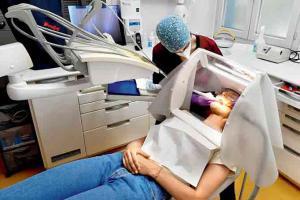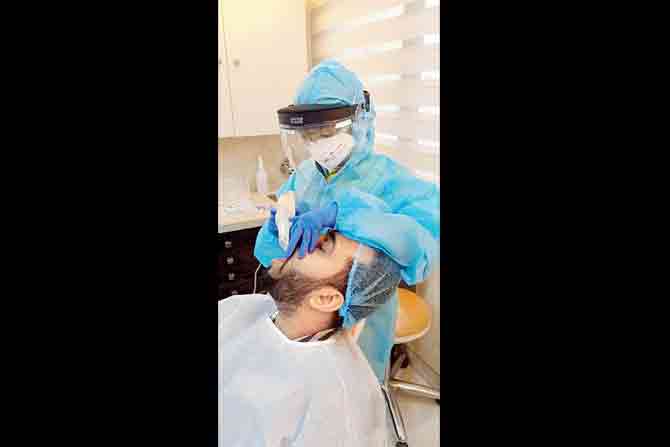Packed with checklists and resources, a Mumbai dentists new book is a ready reckoner for those reopening their dental clinics at a time when oral health treatment is fraught with safety risks

A patient receives care from a dentist protected by a plexiglass and silicon shield against COVID-19, created by the Occisphere company, in Toulouse, France. Pic/ Getty Images
On March 17, a week before the Coronavirus-induced country-wide lockdown was announced, the Indian Dental Association (IDA) issued a bulletin to the fraternity cautioning them about the pandemic. "Be prepared … but don't panic," it said, recommending that doctors voluntarily suspend all dental care services that were non-essential or non-urgent. Mumbai-based dentist Dr Diksha Batra's Bandra clinic, like all others, shuttered temporarily. "We closed on March 19, and it felt like my life had come to a halt," she remembers.
ADVERTISEMENT
Keen to help her community of medical practitioners, Batra began connecting with peers and industry stalwarts to curate a framework to mitigate risks and ensure safe practices. After all, no dental school or management training programme had prepared them for a situation that included not just a prolonged interruption, but also having to deal with a fast transmissible virus that spread through saliva droplets. "We were aware of the guidelines, but there was no clarity on how to put them into practice. We didn't know how much is enough, or how much is too much."
Her just-released book Let's Reset: Pandemic Proofing Your Dental Practice is an attempt to ease the navigation process. The quick-reference digital guide contains more than 90 resources and checklists to help dentists upgrade their systems and pandemic-proof their practice so that they are not vulnerable in times of crisis. The book is divided into sections that focus on disinfection strategies, risk assessment, patient evaluation, sanitisation, limiting aerosol generation and treating high-risk individuals.

Dr Diksha Batra
Batra says dentists are no strangers to pathogens in their work environment. A dentist's clinic must deal with saliva droplets, given the instruments that they use, including drills, scalers and syringes. "The guidelines related to surface cleaning and the personal protective equipment worn by dentists were already part of professional practices before COVID-19 hit. It's the lack of documented behaviour of this virus and how it spreads that made the best of us question our infection control measures." The potential risk also led to people delaying their checkups and neglecting oral health. What complicated matters was an advisory issued on May 7 by the Dental Council of India that warned against performing any procedures that involved the use of aerosols. This essentially ruled out root canals, implants and most other surgical procedures. According to the National Health Profile 2018, India has over 2.7 lakh dentists registered with the Dental Council of India (DCI).
Batra says that cancellation of appointments were fairly routine when clinics were permitted to start operations in June. "Today, patients are more comfortable going in for a regular dental checkup because putting it off to a later day will only result in more pain and higher treatment costs."
During the lockdown, Batra, with help from her mentor Deepak Muchala from IDA, launched a series of videos to help dentists implement new protocols. The intention was to make practical sense of all the data, making it easy to apply, ranging from which equipment to buy and facilitating contactless patient bookings to assuaging patient fears. Batra has also been lecturing virtually across the country over the last few months advising dentists on COVID-preparedness and getting back to work. "What you see in the manual is a condensed version of all those conversations, daily learnings and webinar learnings," she says.
 To minimise the risk of infection, Dr Diksha Batra says clinics should be fitted with HEPA air filters to reduce particle count and turn the air around in the room faster
To minimise the risk of infection, Dr Diksha Batra says clinics should be fitted with HEPA air filters to reduce particle count and turn the air around in the room faster
Most dental practices, she says, are now taking precautions, including installing air purifiers and HEPA filters that capture drill aerosols, vapours and other contaminants, using ultraviolet irradiation to kill any potential circulating germs during aerosol-generating procedures and Class B autoclave to vacuum sterilise instruments. This has also meant a rise in treatment cost. "I see it as an investment, because these practices are now mandatory. That said, there are some [patients] who find no value in it, while others are appreciative of the precautions. Very simply, safety cannot be compromised."
Keep scrolling to read more news
Catch up on all the latest Mumbai news, crime news, current affairs, and a complete guide from food to things to do and events across Mumbai. Also download the new mid-day Android and iOS apps to get latest updates.
Mid-Day is now on Telegram. Click here to join our channel (@middayinfomedialtd) and stay updated with the latest news
 Subscribe today by clicking the link and stay updated with the latest news!" Click here!
Subscribe today by clicking the link and stay updated with the latest news!" Click here!






